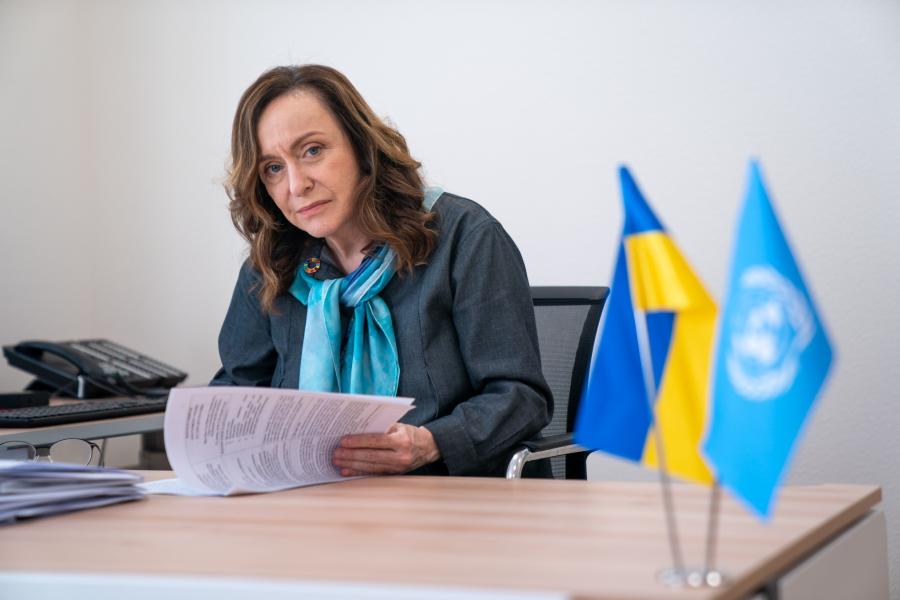Comprehensive assessment confirms devastating impact of COVID-19 in Ukraine
18 September 2020
- UN study presented to Government with recovery recommendations and commitments of support
The results of a comprehensive interagency socioeconomic impact assessment, presented to Government on Friday, confirm that the COVID-19 pandemic is pushing the country towards its worst recession in decades – possibly a depression, with terrible consequences for the most vulnerable. Since the beginning of the pandemic, Ukraine has reported nearly 170,000 confirmed cases of COVID-19 and more than 3,400 deaths.
The United Nations System conducted more than 50 studies to assess the full scope of the pandemic in Ukraine. The socio-economic assessment of the impact on businesses and households, led by UNDP in collaboration with UN Women and UN Food and Agriculture Organization, found that 84 percent of households have lost income and 43 percent have at least one family member who has lost a job. More than two thousand households and enterprises across the country participated in the survey, which is now informing policies and programmes designed to improve lives and livelihoods in the wake of the crisis.
“We must plan for the worst and hope for the best, planning as far ahead as possible,” said UNDP Resident Representative Dafina Gercheva. “What we do now will both soften the blow from the pandemic and contribute directly towards rebuilding the country forward – better, stronger, and more resilient than ever before. The actions we take now will determine what kind of world emerges from this crisis.”
Prime Minister Denys Shmyhal said with the onset of the pandemic, the Government had been faced with the task of finding a balance between epidemic restrictions and allowing the economy to work. “The solution was an adaptive quarantine,” Mr. Shmyhal said. “It allows us to respond quickly to outbreaks in certain areas, but without having to stop the country.” He added that the Government is currently developing a set of measures to allow the resumption of economic growth. In particular, “business support programmes, the privatization of state-owned enterprises, and the stimulation of consumer demand.”
Osnat Lubrani, UN Resident Coordinator in Ukraine, told the Prime Minister the entire UN family in Ukraine is proud to support the Crisis Coordination Management Unit at the Prime Minister’s Office, which was established by UNDP and is providing technical advice to the Government on the socio-economic recovery. “I would like to praise the efforts of the Government to develop the sectoral response strategies that the Unit has been supporting, which draw significantly from the UN socio-economic impact analysis,” Lubrani said. “This crisis is an opportunity to ensure a transformational change though better policies in taxation, social assistance, governance and anti-corruption, environment and climate change.”

The assessment revealed the crisis has impacted people differently in terms of: 1) gender (women, especially those in lower paid, retail sector jobs have been disproportionally affected); 2) economic status (those in higher-paid “desk jobs” can work remotely, while those in lower-paid more manual types of employment have in many cases lost jobs or been laid off); and 3) location (people living in urban areas tend to have much better Internet coverage, access to state services, transport, and employment prospects than those in rural areas).
Additional highlights from the report:
· The crisis and the imposed quarantine and lockdown have caused a reduction in outputs, household spending and trade. The global value chains have been disrupted and this will lead to a steep decline of GDP in Ukraine.
· In general, an over-reliance on social transfers and remittances to drive the economy made the country particularly vulnerable to shocks.
· More than 8 percent of SMEs are on the brink of bankruptcy and may have to close down.
· Unemployment is increasing.
· More than 9 million people may fall back into poverty during the pandemic (increase from 6.3 to 9 million).
· Women and girls are disproportionately affected by the crisis because of their high exposure to the virus. Women account for 82 percent of the total health and social workers (compared to 70 percent average worldwide).
· The crisis and the lockdown have also led to a spike in domestic violence. The reported cases have increased by 30 percent. Many more have no doubt gone unreported – such is the tragic and unfortunate nature of domestic violence.
Recommendations for a sustained recovery to build forward better include:
· COVID-19 response actions should focus first on vulnerable groups such as women, older persons, and people living with chronic health conditions and disabilities.
· Sustain reforms and re-prioritize government spending and policies.
· Create fiscal space through international financing, progressive taxes, increased government efficiency and transparency, and anti-corruption efforts.
· Leverage UN Country Team expertise and institute policies and recovery plans that follow international best practices.
· Maintain essential services and treat COVID-19 at the primary health care level as much as possible.
· Confiscate ineffective or fake medications through improved monitoring and public outreach.
· Scale up spending on health and continue reforms to the public health system.
· Make remote learning available to all students and train teachers in online learning tools.
· Promote a sustainable, inclusive “green” recovery and remove remaining direct and indirect fossil fuel subsidies.
Early UNDP actions in response to COVID-19 in Ukraine
In Ukraine, UNDP acted to support the Government’s response to the COVID-19 pandemic from the very first days of the crisis. On 17 March, just over two weeks after the first case of the COVID-19 disease was confirmed in the country, the Government imposed a strict set of quarantine measures, including closing the country’s borders and requiring citizens to stay at home, only being allowed to go outside to buy food and medicine.
“With the country under quarantine,” said Ms. Gercheva, “UNDP immediately mobilized its partner networks and contributed to the COVID-19 response, providing information leaflets via a housing improvements project that reached around 1.8 million people. Disinfectant and personal protective equipment was provided to medical workers, police and rescuers in eastern Ukraine.” In April, UNDP Ukraine also initiated monitoring on access to public information, with the focus on the COVID-19 outbreak response at the local level. Work has also begun on integrating aspects of coronavirus-related stigma and discrimination to the agency’s work through the Ombudsperson’s regional network. UNDP helped the Government set up Crisis Coordination Management Units, under the Prime-Minister’s Office and the Ministry of Foreign Affairs, with technical coordination by the Vice-Prime-Minister on European and Euro-Atlantic Integration. UNDP then launched a campaign to encourage solidarity and kindness during coronavirus pandemic, and a joint initiative with the independent internet publication platfor.ma to help young women and men aged 14 to 22 to cope with self-isolation, social distancing and quarantine restrictions while staying at home, via the monthly Instagram challenge #bemyquarantine_UA. In another initiative, UNDP organized a hackathon called the #HackCorona Challenge in partnership with the Ministry of Digital Transformation to identify the best tech-based solutions for mitigating and addressing the challenges caused by COVID-19. In conflict-affected east of the country, UNDP helped ten businesses from conflict-affected eastern Ukraine, previously supported by the agency with business grants, to launch online stores selling products from coffee and honey, to linen, home décor and souvenirs.
The most recent UNDP initiative to help improve the conditions for ordinary Ukrainians is through a Chatbot the organization developed in partnership with the Ukraine Chamber of Commerce. The chatbot responds automatically to user queries about ways for micro-, small- and medium-sized enterprises (MSMEs) to mitigate the negative impact of the COVID-19 pandemic. It can also produce pre-filled force majeure certificates and forms to present to landlords and banks.
Ms. Gercheva said it is clear the pandemic is more than just a public health challenge and that the response requires coordinated and sustained efforts from all government ministries supported by UN Development System. “in close collaboration with other members of the UN family, UNDP will continue to support the Government of Ukraine in providing a coordinated, efficient and inclusive response to the COVID-19 crisis, leaving no one behind,” said Ms. Gercheva.



